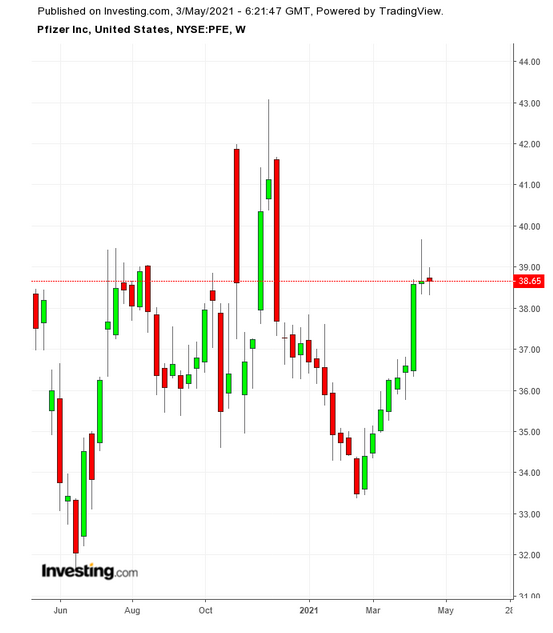- Reports Q1 results on Tuesday, May 4, before the market open
- Revenue Expectation: $13.67 billion
- EPS Expectation: $0.78
Despite developing the first authorized COVID-19 vaccine to be used in the U.S. with German biotech partner BioNTech SE (NASDAQ:BNTX), shares of Pfizer (NYSE:PFE) are nowhere near levels that would indicate investors are celebrating the pharma giant's success.

The stock gained just 8% during the past one year, a period when BioNTech shares surged to more than triple where they were before U.S. approval.
The reason Pfizer shares continue to lag? Analysts simply don’t see US and global vaccine sales producing a big enough impact on the New York-based company’s bottom-line profitability in the near future. Shares closed at $38.65 on Friday.
The global pharmaceutical giant is forecast to post a $0.78 a share profit when it reports its first quarter earnings on Tuesday. That's an almost flat performance when compared with the same period a year ago. Sales will likely grow 14% to $13.67 billion, according to analysts’ consensus estimates.
Pfizer drug sales—along with other global drug makers—are also suffering, since during the pandemic hospitals had to cancel elective procedures in some cases, while some patients chose to defer non-emergency care.
But the unimpressive performance of Pfizer stock creates a good opportunity for long-term investors seeking to buy a reasonably priced healthcare equity.
The company is in a great position to build on its vaccine success and create a permanent revenue stream for the vaccine, the biotechnology used to create it, booster doses and future additional types of inoculations. This is especially relevant given its major rivals, Johnson & Johnson (NYSE:JNJ) and AstraZeneca (NASDAQ:AZN), are dealing with fallout from their vaccines, caused by blood-clotting issues in certain small segments of the overall population.
More RNA Drugs On The Way
Company officials, led by Chief Executive, Albert Bourla, said on a conference call in February that the vaccine looks capable of taking on new variants, its price may increase and new products using its messenger RNA technology are on the way.
Pfizer is already charging a higher price for its COVID-19 vaccine than some rivals, according to Bloomberg. Under the terms of its supply deal with the U.S., it is charging $19.50 for each shot of the two-dose regimen. Meanwhile AstraZeneca, which hasn’t yet gained U.S. approval for its two-dose vaccine, has said it plans to charge less than $4 per shot.
The revenue stream, created by COVID-19, is likely to linger well after the pandemic is over. Bourla told CNBC last week that Pfizer’s experimental oral drug to treat the virus at the first sign of illness could be available by the end of the year.
If clinical trials go well and the Food and Drug Administration approves it, the drug could be distributed across the U.S. by the end of the year, Bourla told CNBC’s Squawk Box.
Along with being the clear lead in the COVID treatment arena, Pfizer is in a good position to unlock further value for its investors after its latest business restructuring.
The company recently completed the spinoff of its off-patent drug unit to separate its older, lower-margin products from its high-growth portfolio. Major blockbusters, including the cancer drug Ibrance, the anticoagulant Eliquis, and the Prevnar vaccine franchise have strong growth potential.
Pfizer’s more than 4% annual dividend yield is another attraction for value investors to hold its shares. With a 60% payout ratio, the company is in a good position to hike its dividend going forward.
Bottom Line
After its successful vaccine development, Pfizer stock is offering an attractive entry point to long-term investors whose aim is to earn steady dividend income from a safe healthcare stock.
Tomorrow’s earnings report could prove that point.
